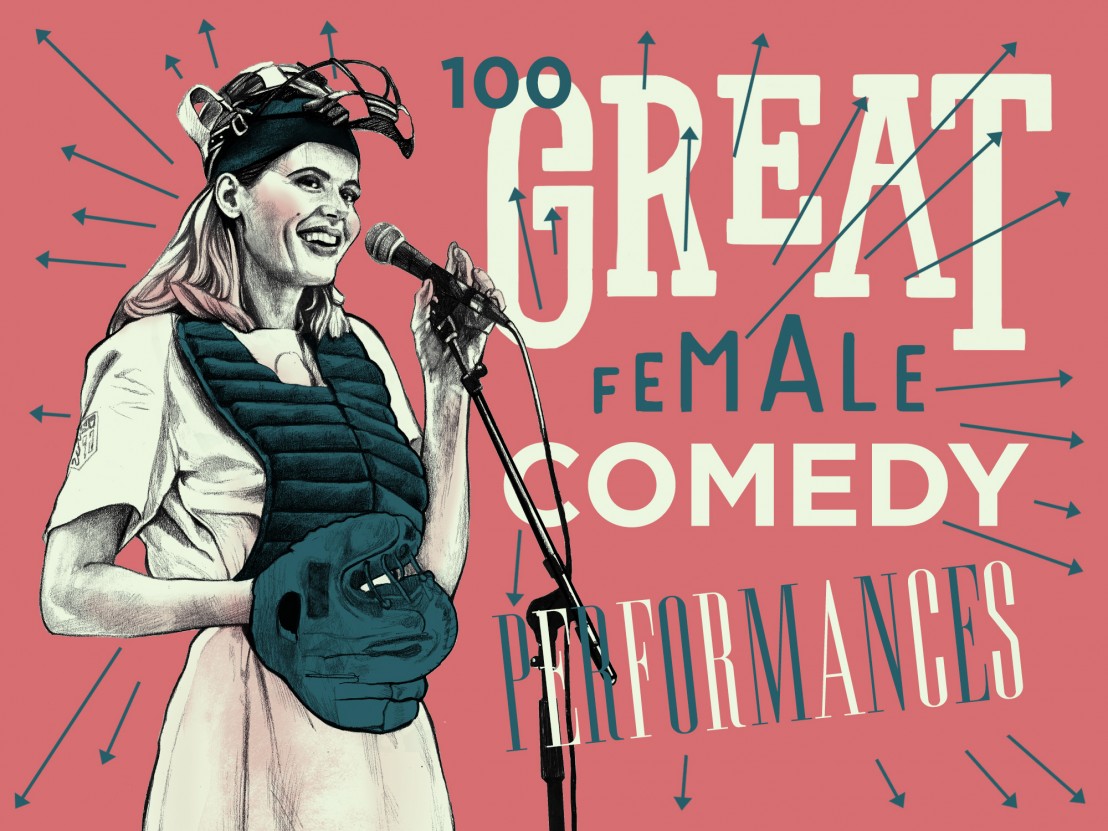
Geena Davis, Greta Gerwig and Emily Blunt step up to the plate in the final part of our toast to women in comedy.
As the most conventional woman in the newly-formed American female baseball league, Geena Davis’ Dottie would be overshadowed by more colourful players – such as Madonna’s provocative Mae – were she not so obviously talented. Davis plays her as a serious woman, claiming to have joined the team for her sister, Kit (Lori Petty), to get in, and to pass the time while her husband fights Nazis in Europe. Yet her devotion to the game and her surprisingly playful acrobatics reveal her thirst for independence. As the players steer away from dictated forms of femininity, Dottie lets herself have her own fun and Davis’ glorious smile finally shines bright. Manuela Lazic
Boy meets girl. Only boy is death-obsessed teenager, Harold, and girl is relentlessly optimistic 79 year old, Maude. Ruth Gordon delivers a radiant performance, embracing Maude’s live-life-to-the-fullest spirit with remarkable sincerity. Like Harold, we are left reeling when she later takes her own life. It is difficult to describe the feeling – a kind of sinking sadness as the credits roll, buoyed by a now-classic Cat Stevens soundtrack and a lingering image of Maude, smiling in her pinned-up braids under a yellow umbrella. Charlie Theobald
Full disclosure: I usually can’t stand Katharine Hepburn. I find her shrill and theatrical, pure technical precision and no soul. The big, huge, gigantic exception is her masterful turn in George Cukor’s superior 1938 trial run for The Philadelphia Story, where she plays a spoiled eccentric who slowly, surely falls for Cary Grant, her sister’s dashing and erudite fiancé. Her character, Linda, hints at a damaged soul beneath the carefree screwball façade, and it remains one of the most singular and sensitive creations in the canon of ’30s comedy features. David Jenkins
What’s the difference between a melodramatic performance and deliberately hamming up a melodramatic performance? The key is to hold back an iota of expressiveness, so that overwrought dialogue has a note of woodenness and flamboyant reactions are held for a beat too long. Italian actress Valeria Golino nails it in this Rambo parody – her second outing opposite a pre-tiger blood Charlie Sheen. Credit is due to the maestro of deadpan Hollywood send-ups, Jim Abrahms (of Airplane! and The Naked Gun fame), but also to Golino for understanding her role perfectly. She uses her piercing-eyed beauty to embody the tortured romantic heroine while using her wits to wring absurd humour out of every gag going. Sophie Monks Kaufman
The screening of Maren Ade’s Toni Erdmann at the 2016 Cannes Film Festival will go down in history not as a moment when the press corps flung jeers and invectives at the screen, but a rare example of when they came together in unalloyed joy and jubilation. This comic examination of the strained relationship between an ageing practical joker and his hard-nosed businesswoman daughter transcends the conventions of a classic comedy of mismatched heroes to say something more profound about life, love and family in the modern world. Sandra Hüller is sensational as Ines Conradi, driven by her cut-throat job but forced by her father to face up to the lost innocence of her young life. Her performance mines the comic nuance from a person desperately trying to remain serious and professional in the face of overwhelming slapstick odds. DJ

Forget Bridget Jones, Nurse Betty is the film Renée Zellweger most deserves to be remembered for. The plot is one of those curious how-the-hell-did-this-get-greenlit capers: a smalltown Kansas waitress has a nervous breakdown upon witnessing the grisly murder of her two-timing husband, only to subconsciously assume the role of a character from her favourite soap opera before tracking down her fictional true love (Greg Kinnear). It’s weird and a little all over the shop, but it works. A sweet-centred Wizard of Oz-esque road movie anchored by a wonderfully scatterbrained lead turn. Adam Woodward
Iranian director Jafar Panahi is a dab hand when it comes to comic female performers. As recent as his 2015 Golden Bear winner, Taxi Tehran, it’s an inquisitive schoolgirl who steals the show. His 1995 feature debut, The White Balloon, showcased his first great female lead: tenacious seven-year-old Aida Mohammadkhani, who works around the problem of making sure the family pond has enough fish in it. She addresses and surmounts a series of tasks to get within spitting distance of her goal, but has to give her all to working out how to retrieve a bank note from a gutter. She is the picture of innocence and optimism, which is amusing in an of itself considering the society she lives in is rife with corruption and violence. DJ
“Yes. Yes, I did it. I killed Yvette. I hated her, so much… it-it- the f – it -flam – flames. Flames, on the side of my face, breathing-breath- heaving breaths. Heaving breaths… Heathing…” It is for this line of dialogue, delivered in Jonathan Lynn’s 1985 boardgame-based farce, Clue, that actor Madeline Kahn will go down in comic infamy. Watch it over and over and over and over. It will improve your life. DJ
It stands to reason that the most underrated Coen brothers’ film should contain the most overlooked female character in their entire filmography. As ball-busting, fast-talking, Pulitzer-winning reporter, Amy Archer, Jennifer Jason Leigh simply steals the show in The Hudsucker Proxy, dishing out delicious, economical insults (“This is a face only a mother could love. On pay day.”) without ever allowing her character’s steely facade – or that flawless Nu Yoik accent – to slip. AW
From earning (and then divesting herself of) the mantle of mumblecore high priestess to dipping her toes in the tepid waters of mainstream Hollywood, Greta Gerwig remains an acquired taste as a screen performer. It just so happens that she is a taste that we have acquired, and we also believe her turn in Noah Baumbach’s Frances Ha (which she co-wrote) is her finest to date. The film is a pure, 110 per cent proof shot of undiluted Gerwig, presenting a small portion in the life of a wannabe dancer who arrives at a personal and professional crossroads. Frances is endearing, infuriating, indecisive and completely human. A mid-point drunken monologue places this performance alongside bubble-headed genius of Diane Keaton in Annie Hall. DJ
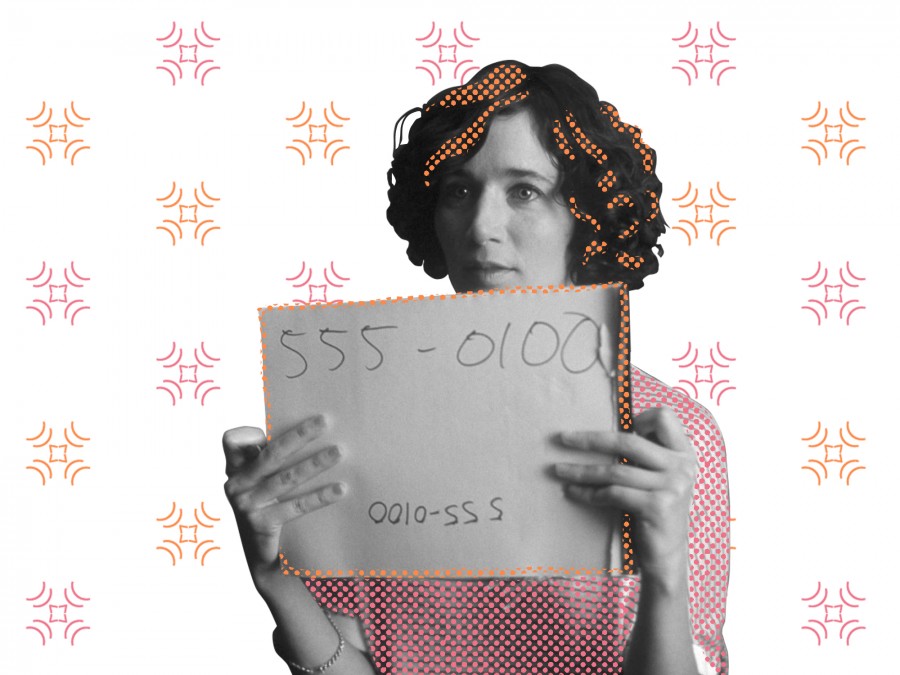
In the opening minutes of Miranda July’s exceptional debut, a man douses his hand in lighter fluid and sets it aflame – his wife has just asked for a divorce. His two boys watch from their bedroom window as he sinks in slow motion to the ground outside, waving his burning limb. But even self-immolation becomes a tender and affecting thing under July’s compassionate direction. July, who herself plays a wide-eyed and lovesick performance artist, reminds us we are not alone in feeling unloved, uncomfortable, and unsure of exactly who we are. CT
Before she starred opposite Jim Broadbent in Mike Leigh’s 1990 comedy, Life is Sweet, Alison Steadman appeared in all six episodes of the made-for-TV drama omnibus Play for Today that Leigh directed in the late ’70s and early ’80s. She’s at her benign, blithe best in 1976’s Nuts in May, in which she challenges her on-screen sparring partner, Roger Sloman, on everything from campsite etiquette to mastication best practices as they holiday in the south of England. Endlessly quotable, eye-wateringly funny stuff. AW
There’s this unofficial thing called The Colin Farrell Effect whereby an actor is deemed to be good even if the film in which they are starring is awful. Emily Blunt fits this bill as she always seems to make the very best of mediocre material. Romantic comedy The Five-Year Engagement, about a couple constantly putting off their wedding for various social and economic reasons, earns a spot in the pantheon of modern comedy greats for Blunt’s hilarious turn as a perpetual wife-to-be. She’s surrounded by fully paid-up comedy actors – Allison Brie, Seth Rogen – and leaves them in the dust. Her Cookie Monster impression is one for the ages. DJ
Holly Hunter is perfectly cast as Jane Craig, a talented and energetic TV news producer. Her unrestrained voice and gestures match exactly with Jane’s devotion to honesty and non-sensational journalism. Yet Jane isn’t so perceptive when it comes to relationships. One can understand why the concept of an intelligent woman falling for an idiot has rarely been portrayed successfully on screen, but with her sense for nuance, Hunter makes Jane relatable and oddly compelling. Rather than a caricature of the burnt-out career woman hanging desperately to a promise of romance, Jane seems never quite sure of herself and aware of the ludicrousness of her situation. ML
John Waters’ trash classic may be infamous for (among other things) Divine’s shit-eating grin, but it’s Mink Stole who delivers the film’s standout moment as one half of the self-proclaimed filthiest couple alive, Connie Marble: “I guess there’s just two kinds of people Miss Sandstone,” she tells a visibly rankled job applicant at her ‘adoption clinic’, “my kind of people, and assholes – it’s rather obvious which category you fit into. Have a nice day.” If there’s a more calloused, more evisceratingly funny line in all of cinema, we haven’t heard it. AW

It often seems like Charlie Kaufman is the only male writer who actually gets women – and by “getting” women, that means understanding that we are complex. Clementine Krycynski, as she is quick to remind us, is a woman, not a concept, and it’s perhaps for this reason that Kate Winslet has described it as her favourite role. It’s so rare to find a character as colourful as Clementine. Winslet knows this and it’s a joy to watch her relish the opportunity of playing a throbbingly three-dimensional woman. She is kind, she is mean, she is funny, she is smart. She’s the closest to me or you we’ll find on-screen. Beth Perkin
Later in his career, Brit iconoclast Nicolas Roeg veered towards, if not full-blown comedy filmmaking, then dashing his intense psychodramas with a touch of the funnies. The dial was turned up way to high in his unwatchably shrill Track 29 from 1988, but he got the balance just right in Insignificance, an adaptation of Terry Johnson’s play which imagines an apocalyptic meeting between Einstein, Babe Ruth, J Edgar Hoover and Marylin Monroe in a New York hotel room. Roeg muse and (then) wife Theresa Russell – one of the great unsung actors of the late 20th century – brings Monroe (though she is never named) to life with bubbly verve and the sequence in which she demonstrates the theory of relativity with a toy train, a balloon and a torch is a jaw-dropping all-timer. DJ
“You get up. You get an abortion. You have a cheese burger. If America laughs at this, America is beyond redemption”. So decry the conservative defenders of the unborn, and therein lies the importance of Jenny Slate’s work in Obvious Child. This is not a film that pokes fun at abortion, but rather an honest tribute to all of us who are scrambling through young womanhood and inevitably tripping up along the way. Unapologetic and vital. Aimee-lee Abraham
Known for being the blueprint for the insanely popular stage musical Chicago, and one of Stanley Kubrick’s favourite movies, William Wellman’s Roxie Hart lives, dies and is reborn once more on the strength of Ginger Rogers’ stellar lead turn. She may have made her name during the ’30s by soft shoe shuffling with Fred Astaire, but Roxie Hart is one example of many which proves she was very happy and able to go it alone. Nunnally Johnson and Ben Hecht’s screenplay is transformed into LOL-peppered poetry in her hands. DJ
The Farrelly brothers are responsible for sparking a thousand sexual awakenings and lifelong aversions to frank and beans with this one. Cameron Diaz’s Mary is the dream girl who materialised long before the manic pixie, but unlike many female characters of the gross-out comedy genre, she feels refreshingly well-thought out. Though tasteless, kudos are also deserved for her ability to rock a quiff held up solely by bodily fluids. ALA
What are some of your favourite female comedy performances? Let us know @LWLies.
Published 24 Jul 2016
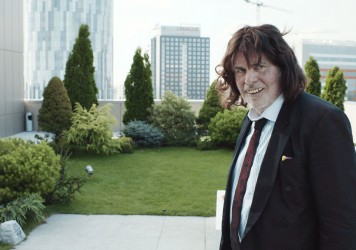
One of the great Cannes competition films of recent years comes from a little-known German director.
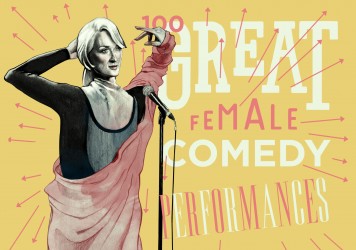
A tribute to some of the most memorable comic turns from women actors, featuring an immortal Meryl Streep.
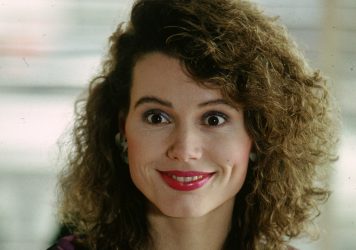
The actor brought us to tears at her recent London Film Festival symposium.